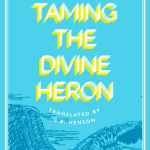Tag Archives: Deep Vellum

The Sacred and the Profane: Luis Felipe Fabre’s “Recital of the Dark Verses,” translated by Heather Cleary
This novel skillfully explores the blurred lines between the sacred and the profane. In 1592, half a year after St. John’s death, a bailiff and his two assistants, Ferrán and Diego, are hired to transport the body of St. John from Úbeda to Segovia. The journey of the secret transfer is long and challenging.

A Trick of the Tale: Reading and Traveling in Sergio Pitol’s “Taming the Divine Heron,” translated from Spanish by George Henson
“Taming the Devine Heron” is Henson’s sixth translation of books by Pitol. It’s also the second of his trilogy “The Love Parade.” The novel is a major work exhibiting Pitol’s cosmopolitan sensibilities. It’s also a meta-narrative that highlights the self-reflection so evident throughout his oeuvre. Pitol’s literary works are grounded in a type of hybridity that combines fiction, memoir, travel narrative, and biography, to name a few genres. In fact, the entire novel could be read as an exercise in literary imagination, which knows no borders and whose boundary is exclusively contained by the human capacity to wonder.

It’s All Relative: The Multifold Self in Sergio Pitol’s “The Love Parade,” Translated from Spanish by G.B. Henson
“The Love Parade” is like a Japanese fan that slowly opens, revealing a beautifully painted landscape while still concealing the face behind it. What we learn about Miguel del Solar is divulged by the huge cast of characters he interviews for his book, each of whom embodies a fragment of his past. He is investigating a murder (or murders) that took place at the Minerva building where he lived as a child, a European-style mini-castle built in 1908 to house the representatives of foreign governments in Mexico City.

Transcending Censorship: Gabi Reigh Interviews Magda Carneci, Author of “FEM”
In this interview, Magda Carneci talks to Gabi Reigh about the poetic dimensions of her prose, the writers and artists who have inspired her feminist vision and what it feels like to read your work in translation.

A Tale of Two Women: Dorota Maslowska’s “Honey, I Killed the Cats,” Translated from Polish by Benjamin Paloff
By Magdalena Kay Dorota Maslowska’s novel Honey, I Killed the Cats takes us on a fast-paced journey through psychological and physical space. Set in an off-putting contemporary city, we are never sure where we are, again neither physically nor psychologically. Although its neighborhoods and streets have British names, this metropolis is anywhere and nowhere—there is […]

Michele Hutchison on Ilja Leonard Pfeijffer’s La Superba, expat writers and translators
Celebrated Dutch author Ilja Leonard Pfeijffer’s autobiographical novel La Superba, titled after the nickname for Genoa, where he has lived for the past six years, is the story of a writer named Ilja Leonard Pfeijffer and the group of expats—legal and illegal—he befriends, as they try to assimilate into the labyrinthine city. I met up […]

Recounting the Past: Michèle Audin’s One Hundred Twenty-One Days, Translated by Christiana Hills
Reviewed by Amanda Sarasien How to tell the unspeakable story…Perhaps numbers tell what words cannot? Our instinct is to rebel against this notion. We think of numbers, cold stats, as faceless, even violent. The Nazis were obsessive counters, tattooing concentration-camp prisoners with numbers to strip them of identity, performing experiments which transformed human beings into […]

Negative Illumination: Ricardo Piglia’s Target in the Night, Translated by Sergio Waisman
Reviewed by Lucina Schell, Editor In November, 2015, Mauricio Macri won Argentina’s presidency in a run-off election, ending twelve years of Peronist-party rule by the Kirchners. Ricardo Piglia’s Target in the Night takes place before the fractured optimism of Perón’s brief return to power in the 1970s, but was published in 2010, the year President […]

